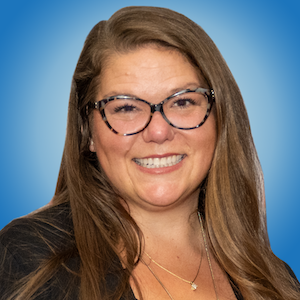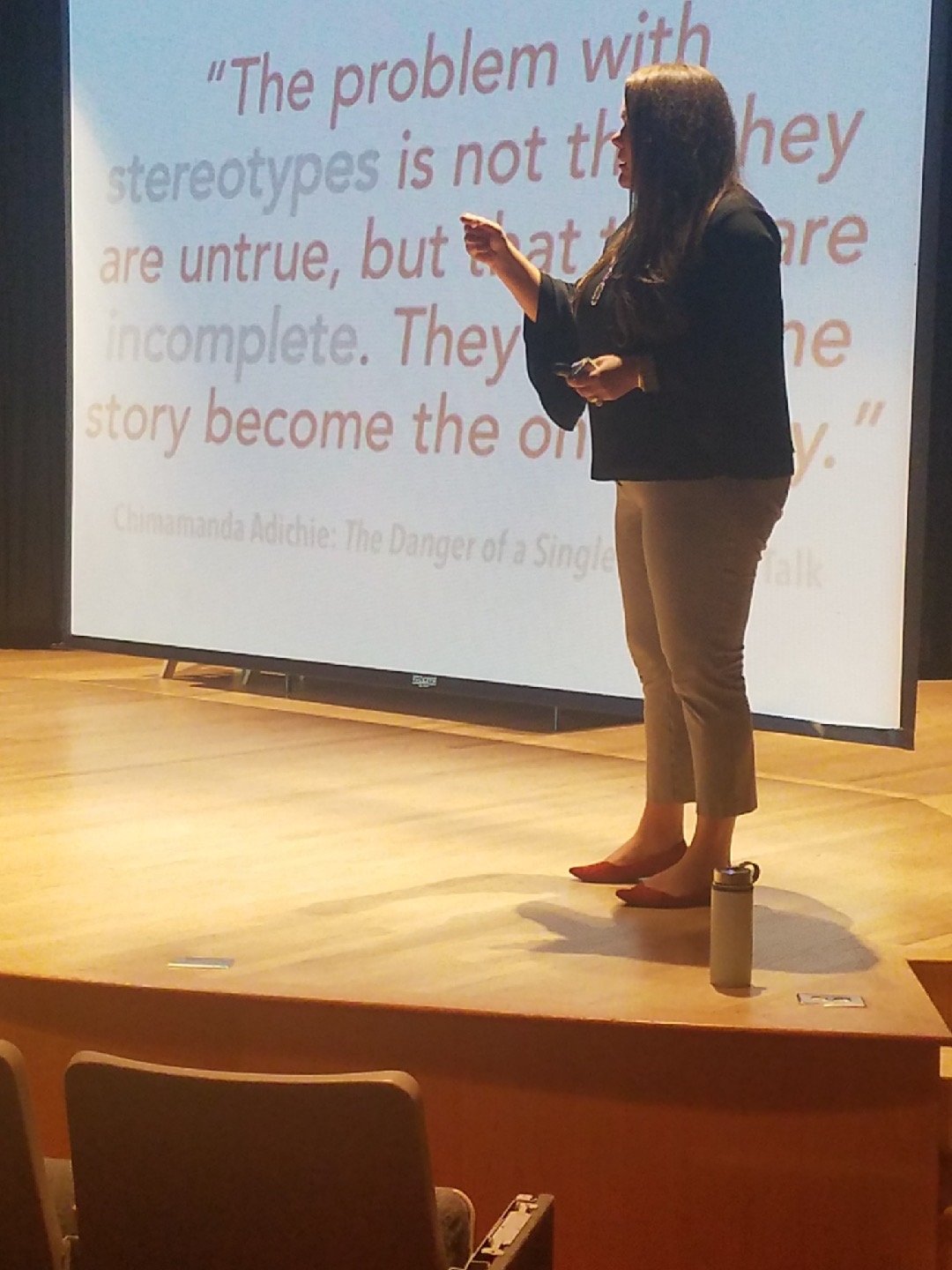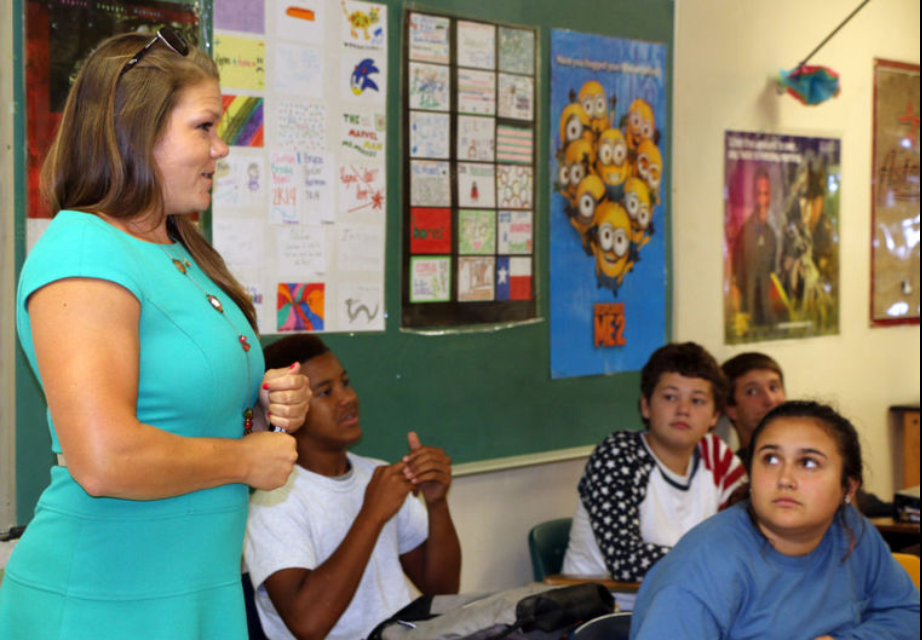ASEE CDEI Scholar Spotlight Series: Meagan Pollock
Meagan Pollock, PhD
Dr. Meagan Pollock began her career playing with light projection on tiny microscopic mirrors as an engineer for Texas Instruments. Through her company, Engineer Inclusion, she now utilizes metaphorical projectors and mirrors to shine a light on micro and macro social systems that, when adjusted, improve student and employee success in science, technology, engineering, and mathematics. A TEDx speaker, author, and a past recipient of the National Science Foundation Graduate Research Fellowship, Meagan holds a PhD in engineering education from Purdue University, an MS in electrical engineering from Texas Tech University, and a BS in computer science from Texas Woman’s University. As an engineer turned educator, Meagan focuses on helping others intentionally engineer inclusion™ in education and the workforce.
Tell us your story of belongingness
 My journey to belonging in engineering has been anything but linear or smooth. My career began in a traditional engineering role where I felt like a square peg trying to fit into a round hole. To experience feelings of belongingness, I shifted and adapted in many unconscious ways that I didn’t realize until after I left industry. To help, though, I got involved in employee resource groups like New Engineers and the Women in Engineering. I also volunteered as a STEM mentor at local schools, led engineering outreach activities, and was a regular guest speaker for students and educators helping them to explore engineering as a career path. All of my extracurricular work as a practicing engineer led me to a PhD in engineering education. I started at Purdue with a mission to change the culture of engineering. This is still my mission, though it’s expanded a bit.
My journey to belonging in engineering has been anything but linear or smooth. My career began in a traditional engineering role where I felt like a square peg trying to fit into a round hole. To experience feelings of belongingness, I shifted and adapted in many unconscious ways that I didn’t realize until after I left industry. To help, though, I got involved in employee resource groups like New Engineers and the Women in Engineering. I also volunteered as a STEM mentor at local schools, led engineering outreach activities, and was a regular guest speaker for students and educators helping them to explore engineering as a career path. All of my extracurricular work as a practicing engineer led me to a PhD in engineering education. I started at Purdue with a mission to change the culture of engineering. This is still my mission, though it’s expanded a bit.
The PhD and career pivot was a liminal state for me. For years, I wasn’t sure where I fit. I didn’t want to pursue a traditional academic professorship path, and I had some big dreams and goals for myself that didn’t seem to fit the mold I was being formed to. I carved a path that has worked well for me, and I’ll continue to carve it every year. Who knows yet where my next chapter will take me?
Alongside four other Engineering Education PhDs outside the Academy, we wrote a paper published in the 2024 ASEE conference proceedings titled “Outsiders: Pathways and Perspectives from Engineering Education PhDs Outside Academia.” In it, you’ll read about our journeys to belongingness in greater detail, including some of our struggles as active volunteers who don’t exactly “belong” within the academic-focused ASEE. We also offer some recommendations.
One way I found belongingness at ASEE was to join and serve in a leadership capacity in the Commission for Diversity, Equity, and Inclusion, where I served as the inaugural chair of the Professional Development Committee for three years before stepping into the three-year term of Chair. The Commission was a great fit for me, given publishing papers hasn’t really been important to me as a service-based consultant, and allowed me to contribute in a way that better aligned with my interests and skillsets. I’m grateful for the people I’ve served alongside in the CDEI and the relationships I’ve built with people along the way.
Here are some web-based articles I’ve written on belonging that might be helpful to others:
Top 10 Reasons Why Belonging Matters
How to Improve Belonging in Your Classroom
5 Ways to Advocate for Belonging at the Institutional Level
Belonging Blinders: Recognizing and Overcoming the Struggle for True Inclusion
Forced vs. Structural Belonging: A Path to Inclusive Environments
Describe your understanding of DEI and why it is essential to what you do
 DEI is the foundation of my business. Through my company, Engineer Inclusion, I help people intentionally and systematically engineer equity and inclusion into their organizations, driving positive outcomes and effectively supporting employees and the community. I write, speak, teach and consult on DEI topics and have many free resources on my website. My mission is to provide services, tools, and resources that inspire awareness and initiate action.
DEI is the foundation of my business. Through my company, Engineer Inclusion, I help people intentionally and systematically engineer equity and inclusion into their organizations, driving positive outcomes and effectively supporting employees and the community. I write, speak, teach and consult on DEI topics and have many free resources on my website. My mission is to provide services, tools, and resources that inspire awareness and initiate action.
What led me to this work is my experience in industry. I experienced things that my male colleagues did not, and long story short–I wanted to make engineering a safer place for women. Along the way, my social consciousness expanded, and now I work to make engineering and other environments more inclusive and equitable for all traditionally marginalized and excluded populations.
So, to describe my understanding of DEI as prompted, especially in an era where it is grossly under attack, DEI is essential. DEI is foundational to creating an equitable society, and in engineering, it is essential to drive innovation that reflects diverse perspectives and meets a wide range of societal needs. I view DEI as the continuous process of breaking down systemic barriers—whether they’re institutional, ideological, interpersonal, or internalized—and replacing them with systems that support all individuals equitably. In my work, this framework informs every project, from creating inclusive learning environments to developing communication strategies that respect and amplify diverse voices.
Additional Reading
How to Practice Systems Thinking for Systemic Change
What is the difference between equality and equity?
Briefly explain the current initiatives you are doing towards DEI
 Over the last year, I’ve focused my work on leadership, communication, belongingness, and positionality. I’ve developed curricula, written articles, spoken on podcasts, and given talks to global audiences on these topics. Given the attack on DEI, and the fact that I live in Texas, I’m working to adjust my topics and language to allow me access to audiences that are hamstrung by legislation, policies, and politics.
Over the last year, I’ve focused my work on leadership, communication, belongingness, and positionality. I’ve developed curricula, written articles, spoken on podcasts, and given talks to global audiences on these topics. Given the attack on DEI, and the fact that I live in Texas, I’m working to adjust my topics and language to allow me access to audiences that are hamstrung by legislation, policies, and politics.
What I’m most excited about right now is a book that will be published at the beginning of 2025. Magic Mirror explores the concept of positionality through an engaging modern fable of growth and understanding. It includes 9 transformative practices that help readers examine their identity, understand their perspectives, and use their power to create equitable change. Each practice builds a bridge between self-awareness and action, guiding readers on a journey to become more intentional, inclusive, and empathetic leaders, educators, neighbors, colleagues, friends, and more.
Resources
Upcoming Book on Positionality: Magic Mirror
Inclusive Leadership (includes TEDx talk, assessment, discussion guide, and more)
Belongingness Resources (linked above also)
What are the next steps for your DEI work?
The field of DEI is changing, and the current climate has posed significant challenges for DEI consultancies, many of which are folding or downsizing. In response to these changes, I filed for a new business name at the end of 2023, shifting from “Engineer Inclusion” to “Engineered Organizations.” The word “Inclusion” was becoming a liability, especially with potential clients like public education institutions in the South, who were facing political pressures that prevented them from hiring DEI-focused consultants. This rebranding is part of my broader strategy to continue engaging with organizations still willing to do the work despite these challenges.
My next steps include rolling out the new brand, Engineered Organizations, and adapting my approach to reach those who want to create positive change. I am focused on maintaining my business and livelihood while acknowledging the reality that I might need to explore additional employment opportunities, as many of my colleagues have had to do.
Despite the challenges, I remain committed to creating meaningful content, engaging in public speaking, and offering education that aligns with my values. While I’ve had to adjust my approach, I still aim to reach those willing to listen and act. At times, this pivot feels like an uncomfortable compromise, as though I am adapting to pressures rooted in white supremacy and patriarchy, but I am choosing to view it as a strategic necessity. We must continue this work, even if that means adjusting our tactics to navigate the current socio-political environment.
Looking ahead, with the upcoming release of my book, Magic Mirror, I plan to increase my public speaking engagements to reach a broader audience, sharing evidence-based practices that support systemic change. I hope that Magic Mirror will inspire readers to reflect deeply on their own experiences and to become more intentional and inclusive in their leadership and daily lives.
What recommendations do you have for engineering educators to start incorporating social justice topics in their classrooms?
 For educators interested in incorporating social justice into their curriculum, I suggest starting with small, tangible actions that make students think critically about their role in society. This could be as simple as facilitating discussions on case studies that highlight real-world issues or examining how biases can influence design decisions. I recommend focusing on how engineering solutions impact different communities and encouraging students to consider ethical implications in their projects. Using an approach grounded in empathy and open inquiry can make DEI topics both accessible and relevant to future engineers.
For educators interested in incorporating social justice into their curriculum, I suggest starting with small, tangible actions that make students think critically about their role in society. This could be as simple as facilitating discussions on case studies that highlight real-world issues or examining how biases can influence design decisions. I recommend focusing on how engineering solutions impact different communities and encouraging students to consider ethical implications in their projects. Using an approach grounded in empathy and open inquiry can make DEI topics both accessible and relevant to future engineers.
Another strategy that professors worldwide have shared with me they are doing is to open the conversation about positionality by having your class watch my 11-minute TEDx talk and complete the positionality exercise.
“Upon discovery, EI’s positionality tool immediately displaced the identity perspectives resource that I was using and enabled me to facilitate a richer and more intuitive conversation with my students. Insights and applications that were not quite clicking with my old approach came much more easily and quickly.” Dave Wilsey, PhD
Positionality Exercise (This is my most downloaded resource, and why I wrote Magic Mirror!)
Ready-Made Discussion Kit: Inclusive Leadership
Our Ready-Made DIY Discussion Kit on Inclusive Leadership is designed to provide everything you need to facilitate an engaging and thought-provoking session on inclusive leadership. This comprehensive package, based on Dr. Meagan Pollock’s TEDx Talk “How to Become an Inclusive Leader,” includes all the tools you need to host a successful event.
What resource can you recommend to people who want to learn more about DEI in your field?
I spend most of my time creating practical, research-based resources people can use. I encourage readers to check out my website for free tools, articles, recorded talks, and, most importantly, please join my mailing list. I try to send one email weekly and commit to sharing something valuable to help people do the work. Upon joining the list, you will receive free access to a virtual course: Unraveling Bias in the Brain: Neuroscience-based Strategies to Reduce Prejudice and Stereotypes.
Connect with our scholar
Join Meagan’s Mailing List here: https://engineerinclusion.com/list
Volunteer Webmaster: Sarah Lester, California Polytechnic State University San Luis Obispo
Getting involved with CDEI
- If you want to recommend someone for our Spotlight series click here.
- Check out website Highlights:
- Resources
- Past Blogs and Events
- Compilation of Newsletters and Reports
-
- Become a Friend of the CommitteeConnect with the committee:
- Become a volunteer on our Communications Committee! We are always looking for people that want to share or improve their writing and leadership skills.

